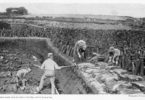We’ve all been there. We discover a new family line to explore, but to our frustration, the surname is incredibly common. Seriously common. Like, millions of unrelated people also have this same surname, and many of them live in the same town or county as your ancestors. When you combine common surnames like Smith, Jones, Johnson, Williams, and such with astoundingly average first names like John, Mary, Michael, William, Margaret, Martha, Elizabeth, and more, it can start to seem like a virtual impossibility to pull out the ancestors who are actually yours from the common named crowd. Here is some tips to get past this common (but no less frustrating) genealogical obstacle.
One of the best methods for finding these ancestors is to use old newspaper articles, as researching the newspapers from the places where your ancestors lived is a good way to identify the people who are actually them. However, if you are using online newspapers, which is the best and easiest way to go, as these are usually indexed by word, allowing you to search and go right to the relevant page, rather than searching the entire newspaper in person at an archive, common surnames can still trip you up. If your ancestor’s name is also the same as a place or a thing, you will get a lot of irrelevant search results. Think of the kind of results you might get by searching online newspapers for surnames like Berry, Gold, Miller, Bacon, or Baker. Daunting, isn’t it?
The good news is that there are ways around this. You just have to know how to search those online newspapers strategically. When you search the right way, you will be amazed at the accurate results you will receive… results that are relevant to your own personal genealogical research and family tree branch.
Use the Include/Exclude Words Field
Most online newspaper databases have this field, and it is a useful one when searching for common surnames and trying to filter out irrelevant results. If your surname is a verb or a noun, you will find this feature especially beneficial. Simply use the Exclude Words field to filter out words commonly associated with the surname. As an example, if your last name is Berry, filter out words like “straw,” “blue,” “goose,” “rasp,” “black,” “cobbler”, “pie,” and “cake.”
You can additionally make use of the Include Words field to narrow down those search results. Try making sure you get results that are actually people by including words like “family,” “Mr.” “Miss,” and “Mrs.” If you want to find an obituary, birth or wedding notice, or notice of a family reunion, include those words, too. Putting words in the Include Words field like “died,” “obituary,” “survivor,” “survived,” “born,” “parents,” “birth,” “wedding,” “wed,” “married,” “ceremony,” and “reunion,” can help you find your ancestors in those old newspaper databases with far greater ease than if you did not use these helpful word fields. Instead of hundreds or thousands of results pages, you will just get a few, or even only one, which makes searching far more targeted and easy.
Try Phrase Searching
If you are sure of the spelling of your ancestors’ last name, you can put it in quotation marks in the search field to get exact search results. The indexing feature of most old newspaper databases may give you results that are spelled similarly, but not exactly, if you do not put the surname (or first name) in quotations. Of course, this only works if you know exactly how the surname was spelled, and if the newspaper did not misspell the name (which was a common occurrence in old newspapers, though usually more common with unusual surnames).
Be sure to include the first name with the last name in quotations to get even more exact search results. Filter it further by trying variations on spellings of first and last names, by abbreviating first names (like “Jno” for “John, or “Jas” for “James), and adding middle initials, to get you closer to the exact ancestor for whom you are searching.
Give the Boolean Feature a Go
Don’t ignore the Boolean search feature on most old newspaper databases. It could be just what you need to find your ancestors. It’s not a difficult search field to use, and its exotic name is nothing to put you off about it… the Boolean feature is just a common and simple search tool with a fancy name, that’s all.
When you use Boolean, you can include Boolean Operators in your search. These operators are connecting words like “and,” “not,” and “or.” This is simply telling the search engine what to do in the search, like NOT including certain words in search results, pairing certain words together (using AND), and giving the search engine a choice of words (using OR).
You can do things like search for “Baker NOT Bread,” “Jones AND family,” or “Walsh OR Welsh.” The OR feature is particularly helpful if you know your family members in the past used more than one spelling for their surname. Sometimes, family members in the same generation spelled their surname differently, such as “Douglass” and “Douglas,” or “Smyth” and “Smith.” Use OR in Boolean to make sure you find the ones who were using a different spelling of the family surname.
Don’t Give Up on That Ancestor
These tips will help you find those ancestors with common surnames (or surnames that are used as places or parts of speech like verbs and nouns). However, you may have to search for a while. There are all kinds of search words, phrases, and combinations you may have to go through before you find your ancestors. You may also have to search more than one newspaper database and even more than one paper. Just keep going. Your commonly surnamed ancestors are there, waiting for you to find them. It will be so rewarding when you do. All the effort you put into it will be worth it.






